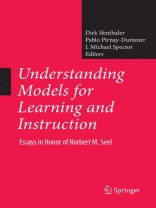For more than 25 years, the pioneering research and theories of Norbert Seel have had a profound impact on educational thought in mathematics. In this special tribute, an international panel of researchers present the current state of model-based education: its research, methodology, and technology. Fifteen stimulating, sometimes playful chapters link the multiple ways of constructing knowledge (and domains as diverse as cognitive science, computer science, and philosophy) to the complex real world of skill development; generalize model-based theories into educational settings; and explain how to design and evaluate model-centered learning environments. Extensive reading lists, provocative graphics, and a wealth of cultural touchstones from the Bible to Bob Dylan make Understanding Models for Learning and Instruction an accessible yet thought provoking collection.
A sampling of the topics covered:
- Evidence-based assessment of learning models
- Translating cognitive theory into educational practice
- New approaches to tracking mental change over time
- Applying psychoeducational theory to the hands-on classroom
- Using games as a strategy for constructing model-centered learning environments
- Externalizing mental models with Mindtools
This synthesis of latest innovations and fresh perspectives on classic constructs makes Understanding Models for Learning and Instruction cutting-edge reading for the researchers and educators in mathematics instruction building the next generation of educational models.
สารบัญ
Foundations and Methodologies of Mental Model Research.- The Fragmented Nature of Learning and Instruction.- Using an Evidence-Based Approach to Assess Mental Models.- Practical Solutions for the Diagnosis of Progressing Mental Models.- Constructing Mental Models during Learning from Science Text.- Progress in the Diagnostics of Mental Models.- Model-Based Theories of Instruction.- Rendezvous with a Quantum of Learning.- Externalizing Mental Models with Mindtools.- Model-Centered Instruction, the Design and the Designer.- Realizing Model-Based Instruction.- Engineering the Model Environment.- Developments in the Design of Instruction.- Bridging a Gap between Psychology and Instructional Practice.- Model-Based Learning Environments.- Model-Centered Learning and Instructional Design.- From Cognitive Theory to Instructional Practice: Technology and the Evolution of Anchored Instruction.- Complex Skills Development for Today’s Workforce.












